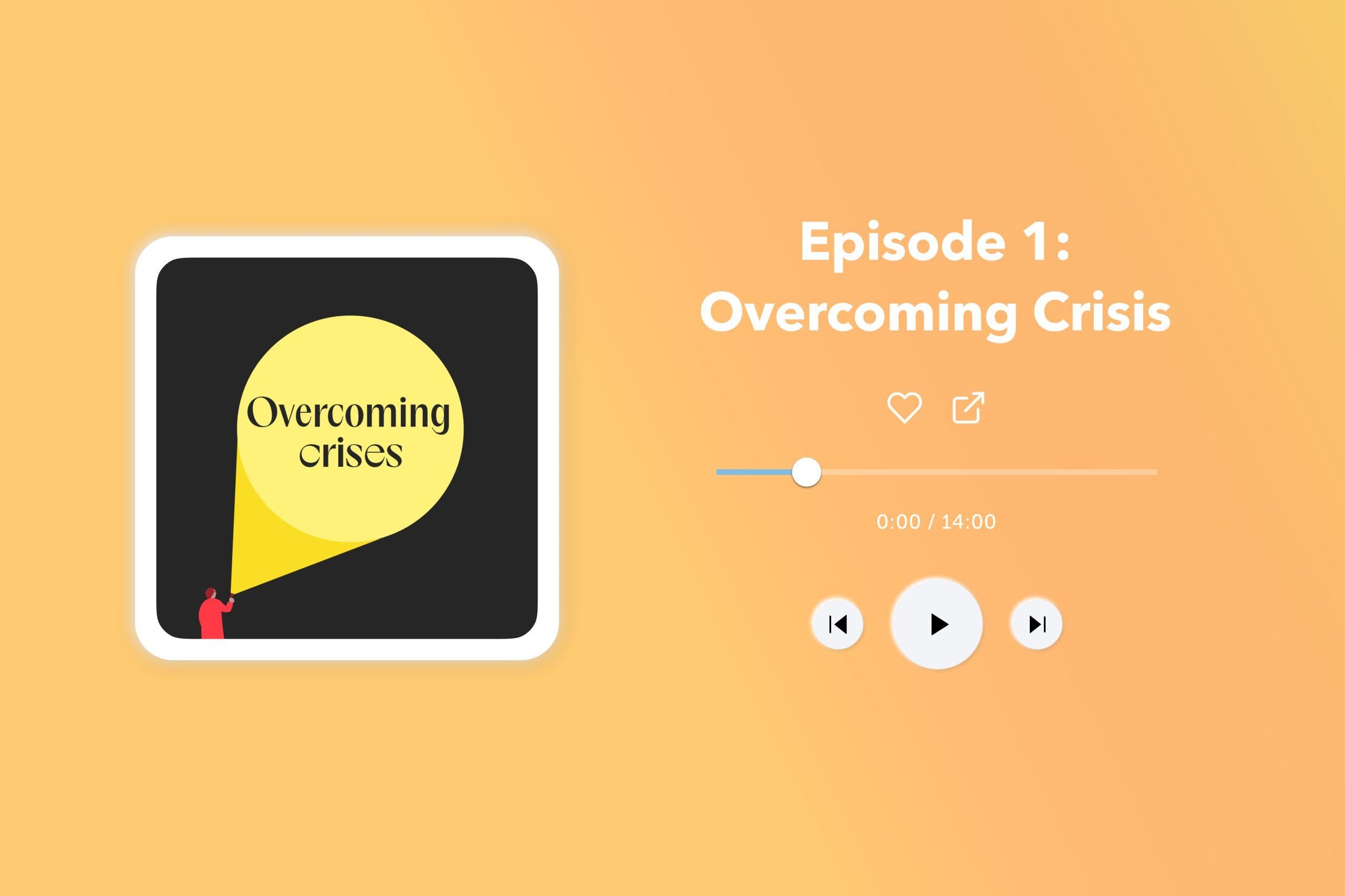
Have you ever felt overwhelmed and anxious in the face of an emergency? Or maybe a sustained season of change and chaos has left you feeling vulnerable and raw? In this guest blog from Arianna Walker, you'll discover some techniques for overcoming crises and leading your emotions well. Let’s jump right in!

Let me tell you about the night I spent sleeping in a cave, by choice! Yes, I know it sounds like a crazy thing to do, but it seemed like a good idea at the time and a fun way to welcome in the new year. I think I had romanticized the idea of it without really considering what reality might be like. I thought that it would go like this: just me and my husband hanging out in the wilderness, away from the hustle and bustle of the city, warmed by a glowing fire, sipping on a cup of tea, and eagerly anticipating the promise of a beautiful sunrise. Oh, how wrong I was! First of all, it took us three long hours to hike up the mountain in the pouring rain and against the gale-force winds. Then, by the time we got to where we were going, it was already getting dark, I was already hungry, and we were both already freezing and pretty fed up. In hindsight, there are a number of things I now know about caves that seem really obvious, but in the moment, I somehow failed to think these things through when I agreed to go. Things such as:

The real low point came once the fire had burned out and lost all its heat, the icy wind had changed direction and was starting to blow directly into the cave, and the darkness outside was so thick it was almost tangible. There were no stars, no moon, no light—anywhere! Finally, to top it all off, the loud snores of my cave companions echoed all around me. Nothing about this experience was what I wanted it to be. Nothing was what I had hoped it would be or how I had imagined it. With every second that passed, I was becoming increasingly frustrated, disappointed, and just downright miserable.
I could feel my emotions spiraling out of control as I started to wonder if this was going to be a metaphor for the year ahead. Would gloomy circumstances and challenging obstacles ruin all of my hopes and dreams? Would I end up frustrated and miserable with everything around me? What if I regretted my decisions and wished I’d known better? As my thoughts spiraled and a lonely tear trickled down my cheek, I felt God’s gentle whisper settle my mind with these words: Remember, David was King in the cave long before he was King in the castle. So, don’t let what you are looking out on affect your outlook. And I would say the same to you today. Wherever you are, whatever you’re looking out on, don’t let it taint your perspective just because you’re looking at a difficult view. Maybe your cave season—the crisis you are facing right now—has you feeling a deep sense of disappointment as you look out on your life and its circumstances. Maybe you’re beginning to feel the cold, the dark, and the heaviness of your situation as it slowly seeps into your thoughts and changes your outlook. Well, you’re not alone, so let’s take a closer look at King David’s story and how he dealt with his cave-season crisis.
David was anointed as the future King of Israel, but the old king, King Saul, is out to get him, so he’s on the run. After he flees, he ends up in a cave, hiding for his life, alone, afraid, and trapped. Theologians have even suggested that David was alone in the cave for 3 to 6 months before his family joined him. That kind of puts my one night in the cave into perspective! However, during his time in the cave, David wrote a number of Psalms that still impact our lives today. One of these is Psalm 142. David wrote this as a prayer while he was trapped in the cave, and it’s filled with heavy emotions. Here’s what it says: “I cry aloud to the Lord; I lift up my voice to the Lord for mercy. No one cares for my life. Listen to my cry, I am in desperate need; rescue me". That’s a lot of emotion right there and David chooses to pour it out before God. David didn’t pretend he was ok. He didn’t hide his feelings. He was open and honest about his need for rescue, about his feelings of abandonment and the depth of his pain. It’s okay not to be okay. And it’s also okay to be really fed up, feeling angry, frustrated and even disappointed.
God isn't scared of our emotions and he’s not offended by our emotional outbursts or feelings of self-pity and despair. He can handle it, after all, he is the one that gave us the ability to feel all the feelings! So, don’t be afraid to be brutally honest with him, even King David was. You see, emotions matter, they need to be heard. Emotions are legitimate feelings and they need to be validated. No matter what we’re feeling, those feelings are real; however, it’s how you handle these emotions and how much power you give them over your actions that really matters. Take a moment and imagine you’re driving a car. Our emotions should be in the passenger seat beside us, describing what the landscape up ahead looks like. They should be indicators of what the situation might cause you to experience. However, they should not be in the driver’s seat. They should not be controlling the roads you decide to take. While our emotions can be heard, they should not be allowed to direct.
When David was in the cave, he went directly to God with all of his emotions. He poured out his complaint before the Lord and bared his heart and all its feelings. Nowadays, too many of us pour out our complaints on social media, and then we wonder why we feel worse. When we are stuck in the cave of our crisis, we need to take everything we’re feeling—every ounce of fear, anger, disappointment, panic, overwhelm, hurt, and betrayal—and lay it down before God. Once David poured it all out and expressed whatever he was feeling in the face of his crisis, he was able to bring direction to his emotions and take control of his feelings. A cave will amplify any sound you make; it will echo back at you and when we face a cave season in life, what we say will always be amplified. So while you need to express how you feel and let all those emotions out like David did, don’t stop there. In every instance in the Psalms where we see David pouring his heart out to God, we also see him choosing to lift God up above his problems and to change his perspective to a divine one. No matter what circumstances he’s up against, David is often quick to open his mouth and glorify his God. In Psalm 77 David begins by declaring his distress. He says: “I cried out to God for help; I cried out to God to hear me. When I was in distress, I sought the Lord; at night I stretched out untiring hands, and I would not be comforted.”
Here David expresses his trouble and the pain of his circumstances. As the Psalm continues, David’s pain is not miraculously taken away but his perspective dramatically changes. Towards the end of the Psalm David’s language shifts from focussing on his despair to exalting the glory of his God. Near the last part of the Psalm David writes: “I will consider all your works and meditate on all your mighty deeds. Your ways, God, are holy. What god is as great as our God? You are the God who performs miracles; you display your power among the peoples.” The emotions you feel when facing a crisis should not be ignored, silenced or minimized. They are real and they are valid. Pour them out before God. You could write Him a letter or a prayer like David did, you can journal your thoughts or go for a walk and tell Him exactly how you’re feeling. You can even go for a drive and shout them out loud if you want to! If you’re feeling an uncontrollable sense of rage or anger, try getting that energy out by running, or tearing up some cardboard boxes. Do whatever you need to do to give your emotions the chance to be heard. Sometimes talking to a good friend or speaking to a therapist can help with that.
But then, once it’s all out there, I want you to invite God in. Lift his name up, focus your thoughts on him and center your outlook on who Jesus is. Give him time to respond to all the emotions, thoughts and feelings you’ve poured out. Lead your emotions into his presence and allow him to share his perspective. Let him bring you his comfort, let him bring you his peace, let him bring you his strength and let him give you his grace to face another day. And as you rest in the presence of your loving Father, remember that David was King in the cave long before he was King in the castle.
Download Glorify Today